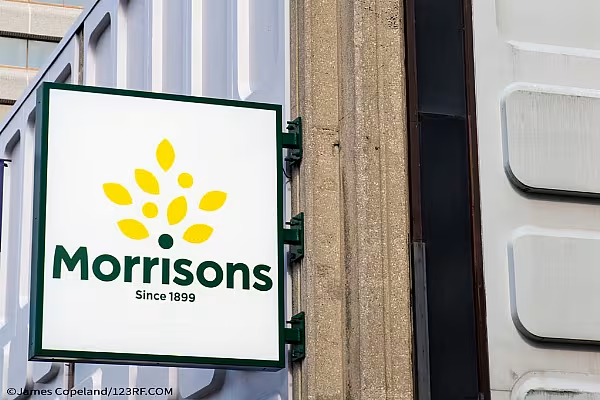Morrisons' £8 billion property portfolio, coupled with its vertically integrated supply chain and wholesale structure, make it a "very attractive" business for private equity investors, a leading retail analyst has suggested.
Ross Hindle, retail sector analyst at Third Bridge, was commenting following the retailer's accepting of a takeover offer from Fortress Investment Group, which values the business at £6.3 billion (€7.34 billion), however other groups, such as Clayton, Dubilier & Rice (CD&R) and Apollo Global Management are also poised to play their hand. Even online giant Amazon could throw its hat into the ring.
Morrisons posted a 2.7% increase in like-for-like sakes in the first quarter of its financial year.
Morrisons' Property Estate
"The first thing that makes Morrisons very attractive from a private equity point of view is their property portfolio," commented Hindle. "They’re around 85% freehold and their estate is valued at over £8 billion."
Of Morrisons' store portfolio, close to 10% of stores are loss-making, which presents an opportunity for disposals, he added, something that could again appeal to investors.
Elsewhere, greater efficiency has enabled the retailer to drive down prices, he added, ensuring it can deal with the price threat posed by Aldi and Lidl, while its online business presents another growth opportunity.
"Morrisons operates a vertical integration model," said Hindle. "While many hail vertical integration as a Morrisons' differentiator, offering provenance, traceability, freshness, and price flex', it also means the supermarket can’t shop around for value. Sometimes their abattoirs, fruit and veg' packing plants, and chilled food production sites don’t operate at full capacity.
"Morrisons has an advantage online over the discounters, and given the structural shift we saw under lockdown this should become an even bigger opportunity."
The Jewel In The Crown
Morrisons' wholesale business could be considered the "jewel in the crown" of the retailer's operation, Hindle noted.
"Our experts say that an acquisition or additional wholesale expertise would help to fully leverage this strength," he said.
For example, the Morrisons Market Street operation is "very labour-intensive but something of a sacred cow within the supermarket's culture. Our experts say there is an opportunity to trim the number of in-store bakeries and dedicated butchers because many customers simply want convenience. Tesco has mostly removed fresh food counters over the last two years without damaging its reputation."
Overall, Morrisons' logistics operation does "not perform as well as the rest of the Big Four," Hindle said; an area where private equity investment could help. In addition, Morrisons labour costs are around one percent higher than those of its rivals, an area that could similarly be addressed.
"The supermarket's management team have put significant investment into refurbishing stores, but the back end of the business has received less investment," said Hindle.
© 2021 European Supermarket Magazine. Article by Stephen Wynne-Jones. For more Retail news, click here. Click subscribe to sign up to ESM: European Supermarket Magazine.














